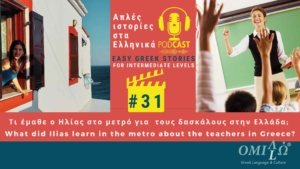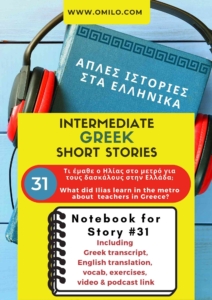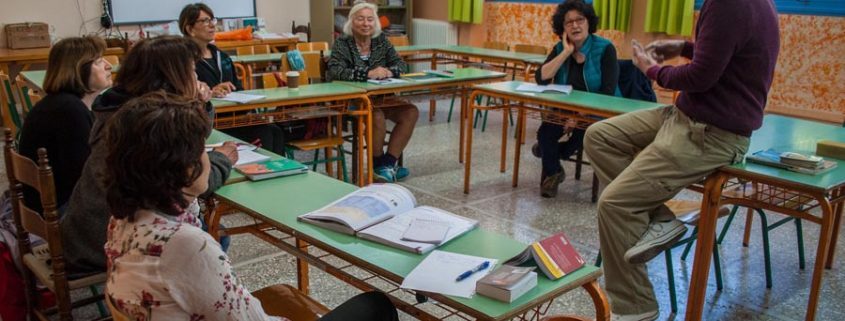“How to become a teacher in Greece”, is something our students often ask.
Every country has a different educational system. The process of becoming a teacher can also vary greatly per country, both for primary and secondary education.
When students book an Greek course with Omilo, the are always impressed with our excellent team of teachers.
All of them are university graduates who, during their career and at Omilo, learned how to teach Greek as a foreign language,
as well as interactive teaching.
They know how to engage adults from many different countries and backgrounds and teach them in a way that allows them to use the language from day one. This is an ongoing process that is a result of hands-on experience, feedback, and continuous training.
Teaching for a private school
Omilo is a private school, so we can look for the right people for our team.
We select teachers based on their professional qualifications, character, open-mindedness, creativity,
and willingness to work in a team, as well as on various locations. Outside the classroom, our teachers help us develop teaching materials.
We do not always select teachers who have studied “Greek Philology”,
but sometimes might opt for a teacher that studied “Philosophy, History, Archaeology”
Every private school has a different profile, and will look for teachers that fulfil their standards.
How to become a teacher in Greece ?
A very different path awaits someone who chooses to become a standard schoolteacher and want to work for the Greek public sector.
Below we will explain how somebody can become a public-school teacher in Greece
–-> all the way from finishing high school as an 18–19-year-old young adult,
to studying at university and then finding employment.
Primary education and kindergarten in Greece
Most Greek universities include departments for the training of teachers in public primary education as well as kindergarten.
The umbrella term used for these departments is called pedagogika, which derives from the Greek word παιδί (en. child) and the verb άγω (en. to lead), i.e. the person who leads the child.
Teacher training lasts four years and leads to a university degree – this is a requirement to teach both in public and private schools in Greece.
Secondary education in Greece
Secondary school teachers have graduated from a university department in the discipline they teach, e.g. physics, maths, Greek Language (also known as philologia), history, music and so on. It’s worth noting that NOT all such degrees necessarily feature teacher training. (So it is more “theory” than “practice”)
After completing their studies, the new graduates of the pedagogic departments can choose to work either for private schools, which follow their own hiring system, advertising open roles like any private company would do, or go through the appointment process for the public sector.
How to become employed in a public school?
Even though it’s lengthy, when a teacher is appointed to a permanent employment in the public sector, this means long-term, stable employment, all the way to retirement. This, together with teaching hours which usually take place between 8am and 12.00-14.00, as well as the many school holidays, means that be employed as a teacher in the public sector can be an attractive career option, especially for women – even when they are not particularly enthusiastic about the work conditions and the time it takes to get a permanent teaching job.
Periodically, the Greek Ministry of Education announces a limited number of permanent teaching roles – there are different lists for primary vs. secondary education as well as for each discipline.
Until a few years ago, teachers took part in competitions announced by ASEP ( the Supreme Council for Civil Personnel Selection in Greece), which selected both permanent and part-time personnel for the public sector. As part of these competitions, teachers needed to take exams on specific subjects related to their discipline. They were ranked based on their results and the ones who performed the best in the exams for each category were hired for long-term positions.
In recent years the system has changed and does not include a written competition,
although there are thoughts to re-implement the previous system.
So how the system works at the moment ?
Teachers and professors are ranked in lists, according to their qualifications. Each attribute gives some points, also known as mória.
The more points (moria) one has, the higher they are on the list and the closer they are to being hired.
(Note; the system changes nearly every year, so we are sorry if there are small mistakes)
How do you collect those points or “moria”?
A complicated system, depending on educational criteria, work experience as well as personal life.
This means that the following always matter;
What grade they have in their University degree,
if they have a master’s degree,
if they know foreign languages (and how many – all to be proven by obtained certificates),
if they have followed some other type of additional training,
how many years they have been working already,
if they have children or if they are disabled.
etc..
From these lists, the Ministry of Education selects individuals for either permanent or part-time employment.
The part-time or annual contracts, are usually renewed every year, but usually always in another school or area in Greece.
If someone is selected for a non-permanent job, they are called ” substitutes”. I
It is also possible to work as “an hourly wage earner”,which means you are paid by the hour.
Also this process of non-permanent contracts gives extra points that will eventually lead to permanent recruitment.
So now you understand that it might take many years between graduation and the first permanent employment in a Greek public school.
This is also because of
a) the large number of teachers in Greece,
and
b) the complicated and demanding appointment system,
and
c) the fact that teaching, especially in public schools, tends to be a life-long form of employment in Greece..
(from the moment somebody “get in this system”, the usually always stay till retirement)
The first years of teaching for the public education…
It’s quite common for teachers who are just starting out to have to spend a few years in the Greek countryside, often in remote villages or islands. Usually, since most universities in Greece are based in large urban centres, after their graduation, teachers choose to remain there and it’s harder for the Greek government to source teachers for more remote locations. This approach allows the state to find staff for kindergartens and schools in rural Greece and teachers get to start their career in the public sector with the hope that they will eventually be moved to a location of their choosing.
Here it is worth noting that most of them will prefer to return to Athens or Thessaloniki, since most of the Greek population lives in these two cities.
Kindergarten, primary and secondary school teachers are employed by the Ministry of Education. Their salaries and career progression depends on years of employment – they can work their way to becoming a headmaster/mistress or a school counsellor.
Note;
Not sure how this works? Then listen to our Podcast story related to public teachers, being sent to remote places.
Click here for all the links


Frontistiria
Frontistiria (gr. φροντιστήρια) can be found all over Greece, and are organised, private institutions that offer private tutoring for all levels of education, usually in the evenings or weekends.
Students’ attendance of frontistiria intensifies during the senior high school years (15-18 years old), when students are preparing for the university entrance exams.
(The system of the “university entrance exam”, is again another long story…click here for more info)
Many teachers opt straight away to teach in these institutions, because they are not willing to go through the public system process that we saw earlier.
Also, very good and charismatic teachers might prefer this option, since they feel they can really make a difference, teach in a more creative way, and help students better.
Private tutoring
Apart from the frontistiria, private tutoring is also very common in Greece and has become an “industry” of its own. With private lessons you can find your own students and create your own schedule. Depending on experience, the exam results of your students and word of mouth, you could earn a very good income. However, most teachers offer private lessons for a limited amount of time, and often change to the public sector when they get the chance, since it offers job security, paid holidays and a good pension scheme.
+++++++++++++++++++++++++++++++
PS. Do you want to learn more about Greece, Greek food, culture, and history, through the eyes of Greek schoolchildren.
Then this eBook is ideal. Known stand-up comedian Fisfis, interviews schoolchildren of the primary school, in their classrooms, and askes them questions related to Greece.
Click here to learn more about the eBook, with video
++++++++++++++++++++++++++



